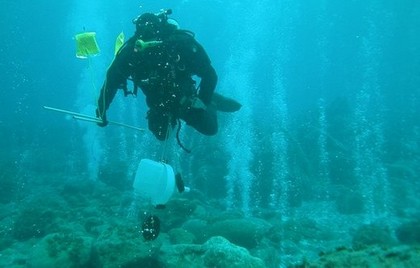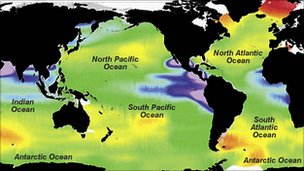Ocean acidification = habitat loss = extinction
'Jacuzzi vents' model CO2 future

A UK scientist studying volcanic vents in the ocean says they hold a grave warning for future marine ecosystems.
These vents have naturally acidified waters that hint at how our seas might change if atmospheric carbon dioxide levels continue to rise.
They are conditions that would make it harder for corals and similar organisms to make the hard parts in their bodies.
Dr Jason Hall-Spencer's work suggests our oceans could lose perhaps 30% of their biodiversity this century.
The Plymouth University researcher has been presenting his latest findings to a major conference in Vancouver, Canada.
"I am investigating underwater volcanoes where carbon dioxide bubbles up like a Jacuzzi, acidifying large areas of the seabed, and we can see at these vents which types of organisms are able to thrive and which ones are most vulnerable," he told the annual meeting of the American Association for the Advancement of Science (AAAS).
Dr Hall-Spencer treats the vents like a time machine. As he swims towards them, the pH level of the water falls and he can use particular locations to simulate what the open ocean will be like in the decades ahead if emissions of atmospheric CO2 go unchecked and much of the that gas is absorbed into sea.
"What we see as you swim along a gradient of carbon dioxide, up to levels we expect for the end of this century, is diversity loss.
"As you go along that gradient, species drop out of the system," he told BBC News.
"It's not all calcified species - ones with hard shells or skeletons - which drop out; there are other organisms with soft bodies which drop out as well.
"This CO2 is a stressor. Some organisms can adapt but there're only a few species that can handle it. If I extend the gradient up to the year 2100 - that represents a 30% loss in biodiversity."
ACIDIFYING OCEANS

- The oceans are thought to have absorbed up to half of the extra CO2 put into the atmosphere in the industrial age
- This has lowered their pH by 0.1
- pH is the measure of acidity and alkalinity
- It ranges from pH 0 (very acidic) to pH 14 (very alkaline); 7 is neutral
- Seawater is mildly alkaline with a "natural" pH of about 8.2
- The IPCC forecasts that ocean pH will fall by "between 0.14 and 0.35 units over the 21st Century, adding to the present decrease of 0.1 units since pre-industrial times"
At the end of last year, Dr Hall-Spencer published his findings on one volcanic vent site off Ischia Island near Vesuvius. But at this meeting, he reported soon-to-be-published data gathered at other volcanic vents in Europe, Baja California and Papua New Guinea. They all show the same outcomes as at Ischia.
"What's strange is that we see some organisms really up-regulate their physiology to try to cope with conditions - they grow faster. But it's like us panting for oxygen at high altitude - they're struggling.
"And in the summer, when temperatures are high, these organisms that are struggling just die. And that's very problematic because of course carbon dioxide not only acidifies seawater, but it is increasing the temperature of the atmosphere. And those two things combined are a double whammy."
 Shells, like this Hexaplex trunculus, dissolve at CO2 levels predicted for later this century
Shells, like this Hexaplex trunculus, dissolve at CO2 levels predicted for later this centuryThe world's oceans have already absorbed a third to a half of the CO2 produced by humans, principally by the burning of fossil fuels, over the past 200 years.
This has resulted in a reduction of the pH of seawater by 0.1 units on the 14-point scale. If emissions of CO2 continue to rise as forecast, there could be another drop in pH up to perhaps 0.4 units by 2100.
These are changes that are occurring far too fast for the oceans to correct naturally, said Dr Richard Feely with the US National Oceanic and Atmospheric Administration (Noaa)
"Fifty-five million years ago when we had an event like this (and that took over 10,000 years to occur), it took the oceans over 125,000 years to recover, just to get the chemistry back to normal," he told BBC News.
"It took two to 10 million years for the organisms to re-evolve, to get back into a normal situation.
"So what we do over the next 100 years or 200 years can have implications for ocean ecosystems from tens of thousands to millions of years. That's the implication of what we're doing to the oceans right now."




Recent comments